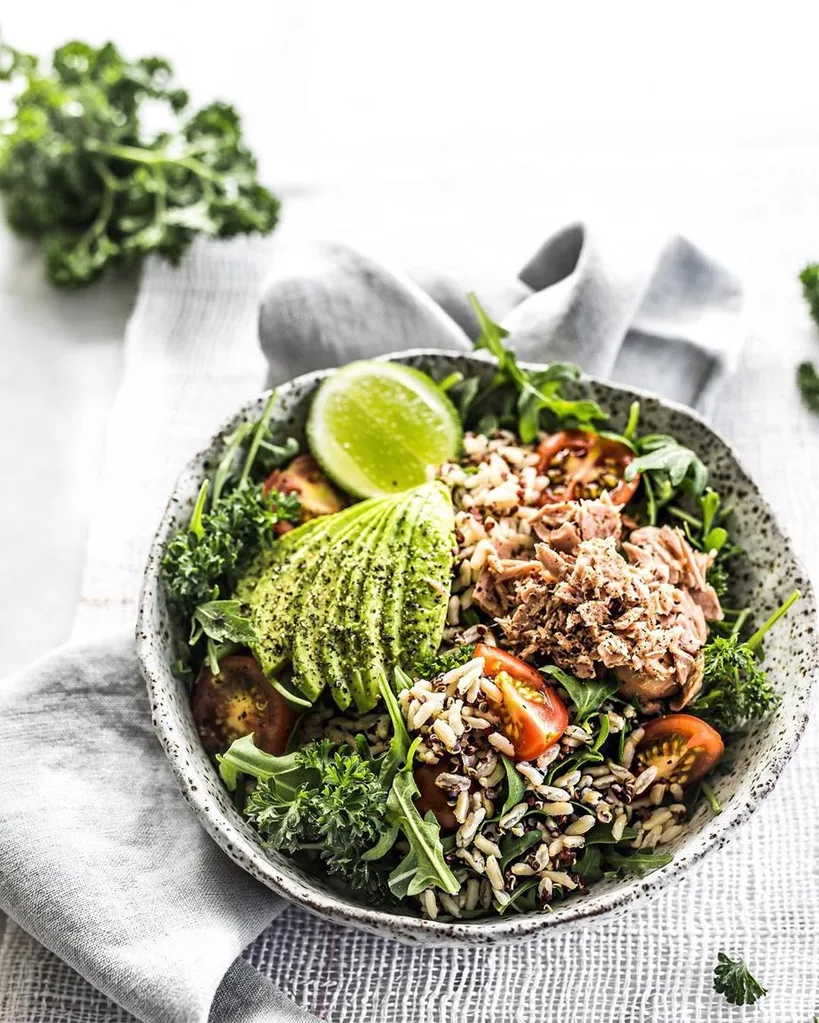In theory, losing weight should be simple: calories in, calories out. In reality? It’s a very different situation.
And while there is truth to the above platitude, frequently espoused by professionals and laymen alike, there are also many sneaky ways in which this simple equation—and therefore your weight loss goals—can be sabotaged.
Fortunately, many of these weight loss mistakes can be rectified with a few simple changes across your diet, exercise routine and lifestyle. And to help us break them down, we consulted Accredited Practising Dietitian Robbie Clark, and Flow Athletic founder and personal trainer, Benjamin Lucas.
Keep scrolling to see them all.
1. Eating Portions That Are Too Big
While you might be eating healthy foods, it’s entirely possible to get too much of a good thing when it comes to weight loss.
“This is the main problem that most people have, their portions are just too big and this is why they put on weight,” Lucas explained.
“Yes, sweet potato and pumpkin are healthy carbs, but that does not mean that you can eat a kilo worth daily.”
According to Lucas, there are a few easy ways to adjust your plate to put you on the road to results.
“My suggestion is to ‘cut’ your plate in half (if this is applicable to you), or fill your plate up with more greens as it doesn’t really matter how many greens you have,” he said.
“My rule of thumb would be that 50% of your plate should be green, then add a lean protein, a healthy carb and a small amount of fat.”
If you prefer a more calculated approach or struggle to determine what a “small amount of fat” actually means for you, it can be useful to use a food tracking app like MyFitnessPal to help you get better at eyeball-measuring your meals.

2. Weighing Yourself Too Often
Although it can be motivating to hop on the scales to monitor your progress, checking too frequently is neither healthy for your state of mind, nor is it going to giving you an accurate picture of your actual weight.
“Some people jump on the scales daily and can’t understand why their weight has fluctuated so dramatically,” explained Clark.
“This frequency of measurement and focusing only on scale weight can have a negative impact on their psychology, motivation and mood, as well as make people feel like they’re not losing weight fast enough.”
Moreover, it’s important to note that the scales don’t necessarily reflect the improvements you may have made along the way, nor do they explain the normal bodily fluctuations that impact weight, Clark emphasised.
“Weight is influenced by several things, and when you start an exercise program, it is likely that you will increase your lean muscle mass. As a result, it’s possible that your weight could stay the same or even increase, even though you might be feeling and looking slimmer,” he said.
“There are other factors that affect the weight on the scales such as fluid retention, if you have been to the toilet or not, menstruation for women, and the time of day.”
If you are going to weigh yourself to track whether you are moving in the right direction, one weekly check-in (ideally at the same time of day each week) is enough. It is also worth considering other methods, such as waist and hip measurements and progress photos, which are often better indicators of physical changes.

3. Overdoing ‘Health’ Foods
Like portion control, narrowing in on your intake of certain ‘healthy’ foods (no matter how delicious Instagram makes them look) could have a significant impact on your progress down the line.
“We know avocado, hummus, quinoa, halloumi, sweet potato, nuts, nut butter and pumpkin are all good for you—but not all in the same meal,” Lucas explained.
“Lots of healthy cafés and restaurants pile these ingredients into their dishes, and they taste amazing, but they are also very fattening.”
To avoid going over the top with any of the above, Lucas recommended choosing only two per meal.
“If you are having avocado and halloumi, leave it at that. If you are having hummus, you don’t also need avocado and halloumi,” he said.
Similarly, it’s important to beware of foods masquerading as ‘healthy’ snacks.
“[For example] Beetroot chips may be made in vegetable oil. ‘Healthy’ drinks, chocolates and sweets often have a lot of coconut nectar, dates or agave,” explained Lucas.
“These are really high in sugar—and it’s fine to eat these dishes, but see them as a treat, and eat lighter for your other meals throughout the day. Having a sugary açai bowl with nut butter, followed by a yogi bowl with all the above in it, followed by a snack high in sugar and saturated fats, then a dinner that is similar to your lunch, will not help you lose weight.”

4. Focusing On Cardio And Ignoring Resistance Training
The pervasive myth that ‘lifting weights makes women bulky’ is unfortunately one of the biggest reasons why women don’t give strength training the air time it deserves when they’re trying to lose weight.
“Most people believe they have to focus on cardio training to lose the most amount of weight, because they are burning more calories,” Clark said.
“This approach may achieve fat loss, but not as quickly or effectively as it would if it was combined with resistance and strength training.”
The biological reasoning behind this is quite simple, Clark noted, with resistance and strength training scientifically considered one of the most effective strategies to build lean muscle and boost your metabolism, and therefore, burn more calories (even when you aren’t exercising).
“By building lean muscle and increasing your body’s metabolic rate, you are more likely to burn more calories at rest,” said Clark.
“I recommend combining cardio and resistance training for best results, and it may be beneficial to seek help from an exercise professional if you’re just starting out.”
And the benefits go way beyond weight loss, if you train often enough.
“Make sure you are doing two to three resistance sessions per week. It is not only great for fat loss, but important for your bone density and mobility later in life,” added Lucas.

5. Not Eating Enough Protein
While successful weight loss relies largely on eating in a caloric deficit (eating fewer calories than you burn) for an extended period of time, this can sometimes cause people to take in insufficient protein, which ultimately isn’t ideal for achieving results.
“When people are trying to lose weight, they are most likely restricting food or reducing their total calories. This can also place them at risk of not eating enough protein throughout the day,” said Clark.
“Protein has been shown to help with weight loss in many ways. It can reduce appetite, increase satiety (feeling of fullness) and decrease total calorie intake. Protein also increases metabolic rate by as much as 15 to 30%, and protects muscle mass during weight loss.”
The amount of protein required varies fundamentally from person to person, and is dependent on your goals, age, current weight, gender and activity levels. While there a number of ‘protein calculators’ available online, we advise you to seek professional guidance from a dietitian or GP to determine your individual needs.

6. Not Setting Specific Goals
As much as we tell ourselves (and our friends) that we just want to lose “a little bit of” weight or do “more” Pilates, the lack of specificity may well be the reason why it’s that much harder to get the results you’re after.
“People might go into a weight loss program with no structure or set goals and just hope for the best. Without structure, there is no accountability. Without accountability, there is no success,” said Clark.
“Setting specific, measurable, realistic and achievable short-term, and long-term goals is a vital part in any sustainable weight loss program. These goals will differ between individuals and can be used as motivation and a reminder as to why you are starting a weight loss journey in the first place.”

7. Not Being Active Enough
Never mind scheduled exercise—most people are sitting too long and aren’t moving enough to enable weight loss, Lucas emphasised.
“This is a big one. Lots of people are not active enough. We are not even walking enough, let alone working out,” he said.
As mundane as it sounds, it’s worth scheduling your workouts into your diary as you would any appointment, and taking every chance you can to sneak in a little incidental exercise or ‘fitness snacking’ (Elsa Pataky is a fan).
“Schedule time to train in your diary. I suggest doing it in the morning before your day runs away with you, if you can. That way, there are no excuses,” said Lucas.
“Pick exercise you genuinely enjoy, because you’ll be more likely to stick with it. Find ways to do incidental exercise, whether it is walking to work, walking to the bus, walking to the water cooler. The more incidental exercise, the better.”

8. Not Prioritising Your Sleep
A severely underrated pillar of achieving good health, not getting enough shut-eye is one of the biggest saboteurs of weight loss, and it’s predominantly women who don’t get enough sleep.
Besides impacting your overall appearance (there’s a reason they call it beauty sleep), it can wreak havoc with your nutrition. Ever felt a desperate craving for carbs after a night of poor sleep? There’s a reason for that.
“A lack of sleep can lead to your craving heavier and more sugary foods,” said Lucas.
“This is because when you don’t get enough sleep, your body overproduces ghrelin, which is the hormone that tells your body you’re hungry, and decreases the production of leptin, which tells you you’re full. So, as a result, you may be more susceptible to making poor food choices or overeating.”
Moreover, if you are exercising and, in particular, doing strength training, sleep becomes extra important for muscle recovery.
“You need rest so your body can recover and repair post workout. If you are not resting, you won’t be getting the full benefit of your workouts either,” he added

9. Having Unrealistic Expectations
With social media perpetuating our desire for instant gratification, while showing us what look like rapid results and ‘perfect’ bodies, it’s not hard to see why many of us fall prey to having unrealistic expectations of our weight loss journeys.
“Some people start their weight loss journey expecting to lose a large amount of weight, quickly. When this doesn’t occur, it doesn’t meet their expectations, and they feel like a failure and may throw in the towel as a result,” said Clark.
“It’s important to take the approach that you are adopting and developing a new lifestyle, rather than looking at it at as something you have to do in order to be a certain weight or to be healthier.
“This lifestyle will include a change in attitude towards the way you consume food and participate in exercise, so that you develop a more positive relationship with both, and are more successful long-term.”










